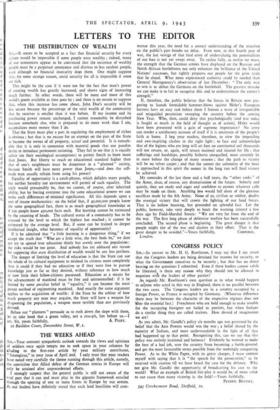THE WEEKS AHEAD ds Sm,—Your constant sympathetic outlook towards the
views and opinions ds of soldiers once again tempts me to seek space in your columns by in alluding to the first-rate article by your military contributor, n" Strategicus," in your issue of April and. I only trust that your readers dhave noted very carefully the theme running through this article, namely, tie the conviction that Allied defeat of the German armies in Europe will
only be attained after unprecedented efforts.
I strongly suspect that the general public is still not aware of the vital part that it can and must play in the gigantic framework entailed through the opening of one or more fronts in Europe by our armies. — As our leaders have definitely stated that such land hostilities will corn
mence this year, the need for a correct understanding of the situation on the public's part brooks no delay. Even now, in this fourth year of war, the last vestige of that fatal error of undervaluing the potentialities of our foes is not yet swept away. To realise fully, as realise we must, the strength that the German armies have displayed on the Russian and North African battlefronts not only enhances the brilliance of the United Nations' successes, but rightly prepares our people for the grim trials that lie ahead. What more experienced authority could be needed than General Montgomery's observation of last December: "The only way to win is to defeat the Germans on the battlefield. The greatest mistake we can make is to fail to recognise this and to underestimate the enemy's strength."
If, therefore, the public believes that the forces in Britain now preparing to launch formidable hammer-blows against Hitler's European fortress have an easy task before them I foresee a wave of irresponsible and misguided pessimism sweeping the country before the coming New Year. Who, then, could deny that psychologically (and war today is fought as much in the field of thought as of action), Hitler would have been presented with a gain of supreme importance? No army can render a satisfactory account of itself if it is uncertain of the people's faith at home. I beg your readers, therefore, to view the impending and awe-inspiring clashes in the right light ; to face and acknowledge' that of the legions who ere long will set foot on continental soil thousands will not return, or, again, will return maimed and injured for life ; that sufferings and hardships, possibly hitherto unequalled, most certainly lie in store before the change of many seasons ; that the path to victory will be no velvet carpet ; and that the sooner the solemnity of the hour is approached in this spirit the sooner in the long run will final victory be achieved.
My comrades of the last three and a half years, the "other ranks" of the Army, shun, of course, any dramatisation of the future. Soberly and quietly, they are ready and eager and confident to answer whatever calls may be made on them. Anything less would fall short of the glorious sacrifices made by the 8th Army. None of us, civilian or soldier, doubts the eventual victory that will crown the fighting of our land forces. That is no hollow boasting, but grounded on splendid fact. Let the public, however, take very deeply to heart the warning uttered a few days ago by Field-Marshal Smuts: "We are very far from the end of the war. The first long phase of defensive warfare has been successfully concluded. The second phase is beginning. The great danger is that people might tire of the war and slacken in their effort. That is the great danger to be avoided."—Yours faithfully, CORPORAL. London.






















 Previous page
Previous page